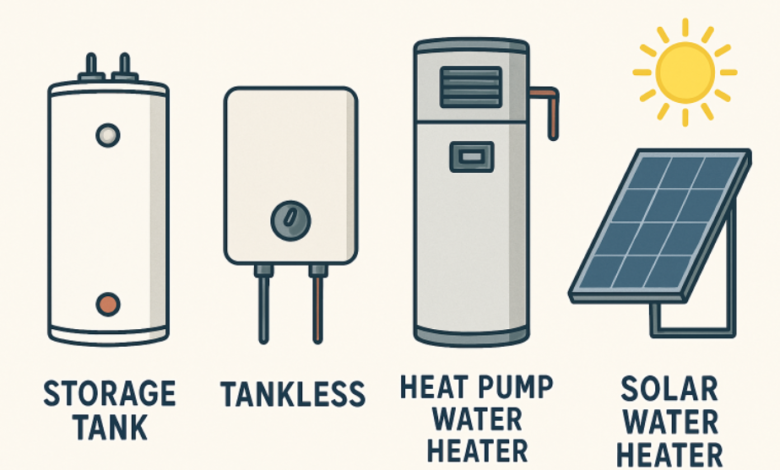How to Choose the Right Water Heater Replacement for Your Home

Why Replacing Your Water Heater Makes Sense
Hot water access is fundamental to a comfortable home, from morning showers to clean dishes. According to the U.S. Department of Energy, water heating can account for about 18% of a household’s energy expenses. If your water heater is old or inefficient, you may pay more for less comfort and reliability. A new, efficient unit brings consistency and safety and helps reduce monthly bills and your environmental footprint.
If you’re considering a replacement, seeking reputable local expertise makes the process much smoother. For residents looking for reliable installation and expert advice, Orem water heater replacement services can provide tailored recommendations to fit your household’s needs and ensure the job is completed efficiently.
Recognizing Signs That It’s Time for a Replacement
Most water heaters last between 8 and 12 years, but age isn’t the only reason to consider an upgrade. Watch out for fluctuating temperatures, rumbling or banging noises, rusty or cloudy water, and visible leaks—these are red flags that your system could fail. A sudden lack of hot water, mineral buildup, or increasing energy bills may also indicate reduced efficiency or critical wear. Catching these warning signs early can help you plan a replacement before a complete breakdown disrupts your daily routine.
Popular Water Heater Types and Their Pros & Cons
- Storage Tank Water Heaters: These are traditional models common in many homes. They use an insulated tank to hold hot water. They’re cost-effective upfront but take up more space and can be less energy-efficient over time, especially if your hot water needs fluctuate.
- Tankless (On-Demand) Water Heaters: These units heat water only as needed, delivering energy savings and nearly endless hot water. While the initial cost may be higher, tankless systems usually last longer and can significantly reduce standby energy loss, according to independent product reviews.
- Heat Pump (Hybrid) Water Heaters: These use electricity to transfer heat from the air or ground into the water. While exceptionally energy-efficient, they are best suited for homes in warmer climates and require more installation space than some alternatives. For more on their work, see the U.S. Department of Energy’s guide on heat pump water heaters.
- Solar Water Heaters: Powered by rooftop solar panels, these units provide a renewable energy option that can significantly lower operating costs. They require a higher upfront investment and rely on sufficient sunlight, making them an ideal choice for eco-conscious households with the proper setup. Learn more from the U.S. Department of Energy’s guide on solar water heaters.
Making Sense of Energy-Efficient Options
Today’s water heaters have benefited from enhanced insulation, improved designs, and advanced digital controls. Check for the ENERGY STAR® label—these systems meet high efficiency standards set by the government. Comparing the Energy Factor (EF) or Uniform Energy Factor (UEF) ratings helps identify models that maximize hot water output using less energy. Some states and local utilities even offer rebates or tax incentives to offset the cost of upgrading to an efficient unit. In addition, tools like those provided by the ENERGY STAR® Water Heaters program can further assist in comparing models for optimal efficiency and environmental impact.
How to Budget and Plan for Water Heater Replacement
Replacement costs depend on the type of water heater you choose, size, and installation requirements. Standard tank-style units are often more affordable upfront than tankless or hybrid models, but remember that more efficient systems often lead to significant utility savings over time. Develop a thorough plan before making a decision:
- Assess your home’s peak hot water usage to select the correct size.
- Research models, checking both performance and warranty details.
- Request quotes from multiple licensed professionals to install and remove your old unit.
- Inquire about any financing options, rebates, or local incentives that could offset initial expenses.
See also: Common Conditions Treated with IV Therapy at Home
Anticipating your needs and planning can turn an emergency replacement into a proactive home upgrade. Do You Need Professional Installation?
Water heater replacement is a project best left to licensed and experienced professionals. Installation involves plumbing, electric or gas line connections, pressure safety considerations, and code compliance. Improper setup can lead to leaks, inefficient operation, property damage, or personal risk. Experts have the right tools and training to handle complex models like high-efficiency, tankless, or heat pump systems, ensuring safe and effective performance while protecting your warranty.
Frequently Asked Questions
- How often should a water heater be replaced? The average lifespan is 8–12 years, but this timeframe can be extended with annual maintenance such as flushing the tank to remove sediment buildup.
- How can I determine the right size for my new water heater? Sizing depends on household size and peak usage. A professional can quickly calculate the capacity needed for an uninterrupted supply for most families without wasting energy.
- Are there ways to improve my current heater’s efficiency before replacing it? Yes, insulating the tank, reducing thermostat settings, and performing regular flushes can help. However, if your unit is aging or has ongoing issues, replacement is typically the cost-effective, long-term solution.
Conclusion
Water heater replacement can feel daunting, but the process becomes manageable and rewarding with some research and professional support. Focusing on efficiency, reliability, and your family’s unique needs will help you select the right type and size of system. Don’t wait for a breakdown—if your water heater shows signs of age or inefficiency, look into available models and consider scheduling an installation now. Making an informed choice today prepares you for years of hot water comfort, energy savings, and peace of mind.




